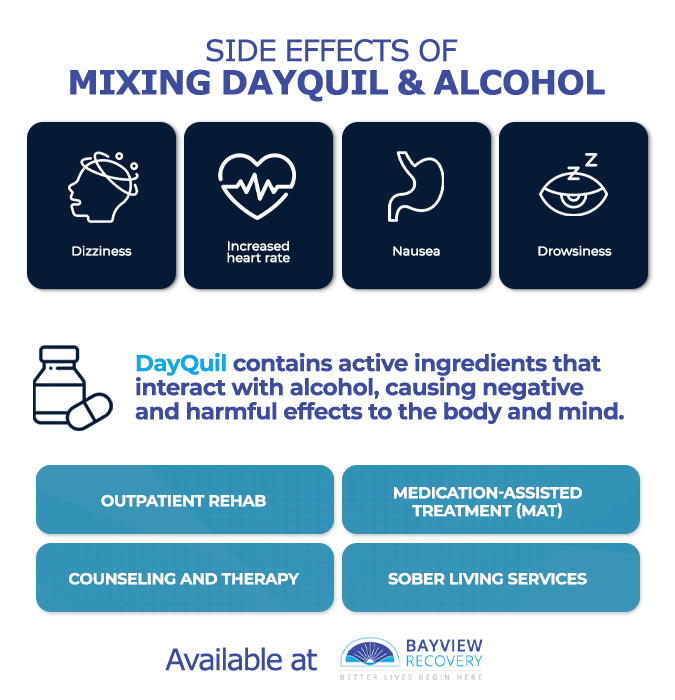Is it Dangerous to Mix DayQuil and Alcohol?
Yes, it can be dangerous to take DayQuil and alcohol. Just because DayQuil is sold over the counter (OTC) does not mean that is completely safe. Especially if you’re mixing it with other substances. DayQuil contains dextromethorphan which is a cough suppressant. It is also one of the two most abused OTC medicines as reported by the National Institute of Drug Abuse (NIDA).
DayQuil also contains phenylephrine, a decongestant, and acetaminophen which is a pain reliever that helps alleviate mild aches and pains. Each of these active ingredients interacts with alcohol in a way that produces harmful effects on the user. In fact, DayQuil should not be mixed with any other substances like alcohol without first consulting with a doctor.
What are the Side Effects of Mixing DayQuil with Alcohol?

Mixing DayQuil with alcohol can have several harmful effects. The combination can cause the following:
- Drowsiness
- Dizziness
- Nausea
- Impaired coordination
- Increased heart rate
- Increased blood pressure
- Increased body temperature
- Difficulty concentrating
- Liver damage
- Stomach bleeding
Additionally, mixing these substances can increase the risk of overdose or death. It is important to always read the label and follow the instructions for any medication, and to avoid drinking alcohol while taking medication unless directed by a healthcare professional.
What is Dextromethorphan?
 Dextromethorphan is an active ingredient found in many over-the-counter cough and cold medications like DayQuil. It works by suppressing the cough reflex in the brain, which can help alleviate symptoms of coughing. Dextromethorphan is often abbreviated as DXM and is commonly found in cough syrups, capsules, and lozenges.
Dextromethorphan is an active ingredient found in many over-the-counter cough and cold medications like DayQuil. It works by suppressing the cough reflex in the brain, which can help alleviate symptoms of coughing. Dextromethorphan is often abbreviated as DXM and is commonly found in cough syrups, capsules, and lozenges.
Dextromethorphan is also considered an opioid however it does not affect pain reduction and does act on opioid receptors the most opioid pain medications do. If DXM is taken in large quantities the medication can have effects similar to depressants and even hallucinogens. Many users also experience euphoric sensations or dissociative effects as well as overall relaxation. It’s not uncommon that users mix DXM with other substances like alcohol and marijuana. Similar to any other substance that is abused, chronic DXM substance abuse can lead to addiction.
How Does DayQuil Interact with Alcohol?
The active ingredients in DayQuil (dextromethorphan, phenylephrine, and acetaminophen) can cause complications when mixed with alcohol. The most common effect from this interaction is drowsiness as alcohol is a depressant with these effects multiplied as it’s mixed with DayQuil. Here are other ways these substances interact when mixed with alcohol and how they ultimately affect the body.
Dextromethorphan and Alcohol
Mixing DXM (dextromethorphan) with alcohol can be dangerous and is not recommended. Both substances can have sedative effects on the central nervous system (CNS), which can lead to increased drowsiness, dizziness, and impaired coordination. This combination can also cause respiratory depression, which is a potentially life-threatening condition that occurs when breathing slows down or stops altogether. In addition, both DXM and alcohol are metabolized in the liver, and combining them can increase the risk of liver damage or failure.
Phenylephrine and Alcohol
Mixing phenylephrine and alcohol can be dangerous as they can increase the risk of side effects such as dizziness, lightheadedness, and impaired coordination. Phenylephrine is a decongestant that works by narrowing blood vessels in the nasal passages to relieve congestion. Alcohol, on the other hand, is a depressant that slows down the CNS The combination of these two substances can cause an exaggerated response to either one, leading to increased sedation and difficulty performing tasks that require alertness. In addition, drinking alcohol while taking phenylephrine can also increase the risk of high blood pressure and heart problems.
Acetaminophen and Alcohol
Mixing acetaminophen and alcohol can be dangerous and should be avoided. Acetaminophen is a pain reliever and fever reducer that is commonly found in over-the-counter medications such as DayQuil and Tylenol. Alcohol consumption while taking acetaminophen can increase the risk of liver damage or failure, as both substances are metabolized in the liver. The combination can also increase the risk of gastrointestinal bleeding, stomach ulcers, and kidney problems. In addition, drinking alcohol while taking acetaminophen can cause an exaggerated response to either substance, leading to increased sedation and difficulty performing tasks that require alertness.
What are the Risks Associated with Mixing DayQuil and Alcohol?
1) Liver Damage
Taking DayQuil with alcohol can cause liver damage and even liver failure when taken together because both substances are metabolized in the liver. When you drink alcohol, your liver works to break down the alcohol and remove it from your body. Similarly, when you take Dayquil, your liver works to break down the active ingredients in the medication so that they can be eliminated from your body. However, when you consume both alcohol and Dayquil at the same time, your liver has to work even harder to metabolize both substances, which is damaging to liver cells.
2) Unconsciousness
Taking DayQuil with alcohol can cause unconsciousness when taken together due to their combined effects on the central nervous system. Both alcohol and DayQuil can cause drowsiness, sedation, and impaired coordination, making it difficult to perform tasks that require alertness or attention. When taken together, these effects can be intensified, leading to a greater risk of loss of consciousness. Combining alcohol with any medication that has sedative properties like DayQuil increases the risk of respiratory depression and loss of consciousness.
3) Stomach Ulcers or Bleeding
Alcohol and Dayquil can cause stomach bleeding when taken together due to their combined effects on the lining of the stomach. Both alcohol and DayQuil can irritate the stomach lining, leading to inflammation and damage. When taken together, these effects can be intensified, increasing the risk of stomach bleeding.
Dayquil contains acetaminophen, which is a pain reliever that can cause irritation and damage to the lining of the stomach when taken in high doses or for prolonged periods. Alcohol also has a similar effect on the stomach lining, as it increases acidity and irritates the digestive system. When taken together, alcohol and DayQuil can further increase this irritation and lead to bleeding in the stomach.
Additionally, some people may be more susceptible to these risks when taking alcohol and DayQuil due to underlying medical conditions such as ulcers, gastrointestinal bleeding disorders, high blood pressure, or asthma. Again, just because DayQuil is an over-the-counter medication does not mean it doesn’t come with risks.
Can Alcohol be Taken with any OTC Cold or Cough Medications?
No, alcohol should not be taken with any cold medication without consulting a healthcare professional first. Many cold medications, such as cough syrups and decongestants, contain ingredients that can interact with alcohol and lead to dangerous side effects. For example, mixing alcohol with some cold medications can cause drowsiness, dizziness, impaired coordination, and difficulty breathing. In addition, drinking alcohol while taking certain cold medications can increase the risk of liver failure. It is important to read medication labels carefully and talk to a healthcare professional before combining any medication with alcohol to avoid potential interactions or harm.
Can Someone Suffer From Withdrawal Symptoms From Combining Alcohol and DayQuil?
Yes, someone can suffer from withdrawal symptoms from combining alcohol and DayQuil. Both alcohol and DayQuil can be habit-forming and may lead to dependence or addiction over time. When taken together, they can intensify these effects and increase the risk of withdrawal symptoms when a person stops using them.
Alcohol is a depressant that can cause physical dependence in some people who use it regularly. This is commonly referred to as alcohol addiction or alcohol abuse. When a person chooses to stop drinking after prolonged use, they may experience withdrawal symptoms such as tremors, sweating, nausea, anxiety, or seizures. These symptoms can be intensified when combined when taking DayQuil.
Could Mixing Alcohol with DayQuil be a Sign of Substance Use Disorder?
 Mixing DayQuil with alcohol can be a symptom of a bigger issue. It may indicate that someone is struggling with alcohol use disorder
Mixing DayQuil with alcohol can be a symptom of a bigger issue. It may indicate that someone is struggling with alcohol use disorder
or addiction, which can have serious physical, psychological, and social consequences.
People who mix DayQuil with alcohol may be using the medication to enhance the effects of alcohol or to counteract the negative side effects of drinking, such as a cough or congestion. This behavior may indicate that they are developing a tolerance to one or both substances and need higher doses to achieve the desired effect. Over time, this pattern of use can lead to dependence or addiction and increase the risk of harmful health outcomes.
Furthermore, mixing DayQuil or other cough medicine with alcohol can have dangerous interactions that affect the central nervous system, respiratory system, and liver function. These interactions can intensify the effects of each substance and increase the risk of overdose, seizures, or organ damage.
If someone is regularly mixing DayQuil with alcohol or showing signs of substance use disorders or addiction, it’s essential to seek help from a healthcare professional or addiction specialist. Treatment options may include therapy, support groups, medication-assisted treatment (MAT), detoxification programs, or rehabilitation services tailored to their individual needs.
What Treatment Options are Available for Addiction Treatment?
 There are several treatment options available for DayQuil and alcohol addiction, depending on the severity of the addiction and individual needs. Some of the most common treatment options include:
There are several treatment options available for DayQuil and alcohol addiction, depending on the severity of the addiction and individual needs. Some of the most common treatment options include:
- Detox: This process involves removing all traces of alcohol and DayQuil from the body under medically supervised detox to manage withdrawal symptoms safely.
- Inpatient Rehabilitation: Inpatient rehabilitation programs provide a structured environment where individuals can receive intensive therapy, counseling, and support to address their addiction.
- Outpatient Rehab: Outpatient rehabilitation programs offer similar services as inpatient programs but allow individuals to live at home while receiving treatment.
- Counseling and Therapy: Individual or group counseling sessions can help people overcome underlying issues that contribute to their substance abuse and develop coping skills to prevent relapse.
- Medication-Assisted Treatment (MAT): MAT uses medications such as naltrexone or acamprosate to reduce cravings for alcohol or drugs and manage withdrawal symptoms.
- Support Groups: Support groups like Alcoholics Anonymous (AA) or Narcotics Anonymous (NA) provide ongoing support and encouragement from peers who are also in recovery.
It’s important to note that every person’s journey toward recovery is different, so it’s crucial to find a treatment plan that works best for them with the help of a healthcare professional or addiction specialist.
Contact Bayview Recovery Today!
If you or someone you love is struggling with alcohol addiction, over-the-counter medications, or even addiction to prescription drugs, contact Bayview Recovery today! We work with individuals that suffer from all types of substance use disorders and mental health conditions.
We offer a variety of addiction treatment programs that help individuals overcome physical and psychological dependence. Our team of addiction treatment professionals develops individualized programs for each and every person. You can find lasting recovery with Bayview!

 Dr. Dave Cundiff, MD, MPH (Medical Reviewer)
Dr. Dave Cundiff, MD, MPH (Medical Reviewer)






